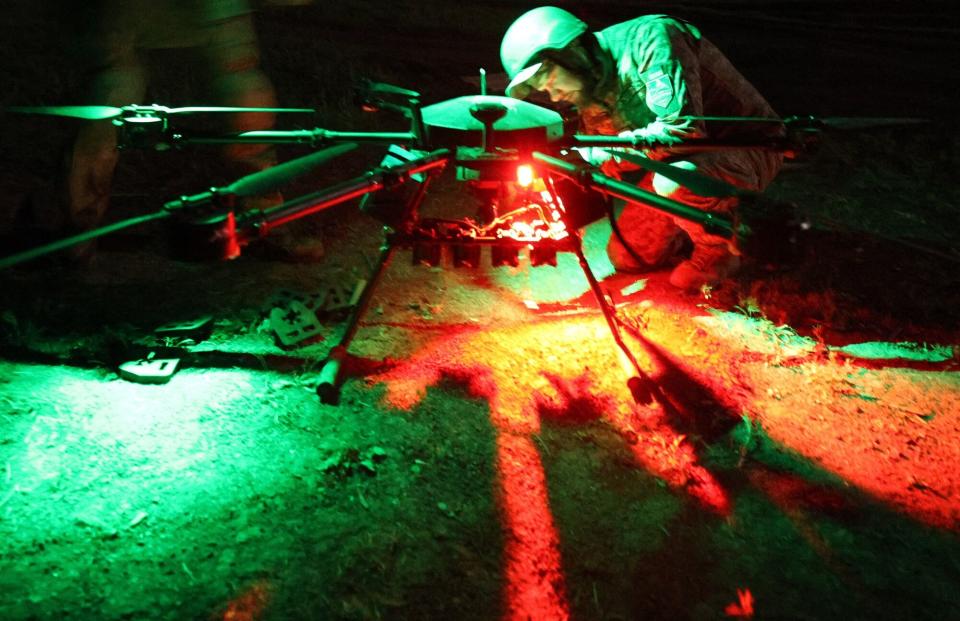NATO to Expand Defense Tech, Intelligence Sharing with Kyiv

(Bloomberg) -- NATO is planning to expand cooperation with Ukraine on defense technology and share more intelligence about Russia’s electronic warfare capabilities, as some of its members lift constraints on Kyiv’s ability to wage war.
Most Read from Bloomberg
Apple Hits Record After Unveiling ‘AI for the Rest of Us’ Plan
NYC Landlord to Sell Office Building at Roughly 67% Discount
Fed’s Higher-for-Longer Stance Hits Firms That Expected Rate Cut
The conflict has pushed the North Atlantic Treaty Organization to devote more resources to cybersecurity deterrence and tracking Russia’s military tech, Assistant Secretary General David van Weel told journalists this week.
“Ukrainians are innovating at a very high speed,” he said Tuesday in Krakow, Poland. “But of course, the Russians are not stupid. That means innovation in the battlefield is not a static thing. It’s more like chess.”
Recent Russian advances have led Ukraine’s allies to loosen restrictions on weapons they provide, with the US and Germany authorizing attacks on Russian territory for the first time. Such strikes had previously been forbidden for fear of antagonizing the country with the biggest nuclear arsenal.
An agreement that introduces new frameworks for sharing information, including on supply chains for drones, will be finalized in time for the alliance’s July summit in Washington, according to van Weel.
One goal of the program is to help make Ukraine a large-scale tech provider once the war ends. NATO also wants to replicate some of the rapid tech adoption and deployment seen in Ukraine since the war started, van Weel said.
Van Weel spoke at the inaugural Defense Innovators Forum, a conference that featured representatives from 17 countries including Ukraine, Belgium and the US, as well as dozens of startups building battlefield equipment.
Military Supply
At the conference, NATO and US officials frequently pointed to the rapid tech development in Ukraine since the start of the war with envy.
Alex Bornyakov, Ukraine’s deputy tech minister, gave reporters in Krakow a blunt assessment of his country’s approach to purchases. “It’s very simple,” he said. “If it kills Russians, we buy it.”
Last month, Ukraine tightened its military procurement rules after corruption allegations led to a shakeup in its leadership ranks.
According to NATO and Ukrainian officials, Russia’s tech strategy relies heavily on buying drones from Iran and components from China. Russia’s military has circumvented sanctions to buy Western tech through third-party vendors. It’s also developed new technologies, including ones that can evade acoustic sensors set up to locate drones.
GPS Jamming
A major theme of the event was how to counter Russia’s persistent jamming of the Global Positioning System, which has rendered some Ukrainian drones and foreign precision weaponry ineffective.
GPS interference attributed to Russia has increasingly affected NATO member states in northern Europe, disrupting flights and maritime traffic in the Baltics and Finland.
To respond to Russian jamming, Ukrainian startups are developing drones that can map terrain without GPS, navigating with on-board cameras or sensors.
The Krakow event included a “speed-dating” session between startups and investors, including the NATO Innovation Fund, a €1 billion ($1.1 billion) investment vehicle launched last year that’s starting to make deals.
Patrick Schneider-Sikorsky, a NIF partner, said many drone developers he meets promise their next generation devices will not rely on GPS.
Arms Race
Some are chasing other tech advances in the war. Both Russia and Ukraine are working to locate drones based on sound. Schneider-Sikorsky said he recently met a company developing drone motors that are entirely silent. “It’s quite literally an arm’s race,” he said.
For Ukrainian startups at the Krakow event, funding is needed just as much as technical progress.
Yaroslav Filimonov, chief executive of electronic warfare startup Kvertus, said Russia’s battlefield advances don’t prove they have better quality tech.
“They are winning with quantity,” he said. “And with budgets.”
(Updates with additional details on attendees in the seventh paragraph)
Most Read from Bloomberg Businessweek
As Banking Moves Online, Branch Design Takes Cues From Starbucks
Food Companies Hope You Won’t Notice Shortages Are Raising Prices
Legacy Airlines Are Thriving With Ultracheap Fares, Crushing Budget Carriers
Sam Altman Was Bending the World to His Will Long Before OpenAI
©2024 Bloomberg L.P.

 Yahoo Finance
Yahoo Finance 